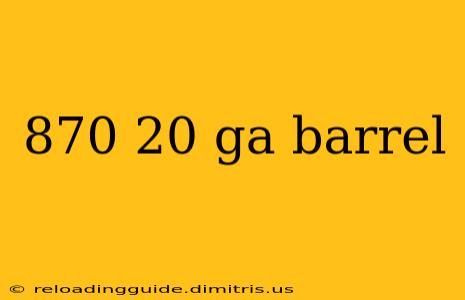The Remington 870, a legendary pump-action shotgun, is celebrated for its reliability and versatility. Choosing the right barrel significantly impacts its performance, and the 20-gauge option offers a compelling blend of power and manageability. This guide delves into the specifics of an 870 20-gauge barrel, exploring its advantages, considerations, and applications.
Why Choose a 20 Gauge Barrel for Your Remington 870?
The 20-gauge barrel for the Remington 870 presents a compelling alternative to the more common 12-gauge. Its advantages stem from a combination of reduced recoil and weight, making it an excellent choice for various shooting disciplines and user demographics.
Lighter Recoil and Reduced Weight
The primary benefit of a 20-gauge barrel is its lighter recoil. This is particularly advantageous for new shooters, smaller-statured individuals, or those who find the recoil of a 12-gauge excessive. The reduced weight also contributes to improved handling and faster target acquisition.
Enhanced Maneuverability
The lighter weight and smaller gauge translate to improved maneuverability, particularly in tight spaces or during quick target transitions. This makes the 20-gauge 870 ideal for home defense, hunting in dense cover, or sporting clays where swift target engagement is crucial.
Variety of Ammunition Options
Despite being a smaller gauge, the 20-gauge offers a wide variety of ammunition types, including birdshot, buckshot, and slugs. This versatility extends the 870's functionality across various applications, from hunting small game to home defense scenarios.
Choosing the Right 870 20 Gauge Barrel: Key Considerations
Selecting the perfect 20-gauge barrel for your Remington 870 depends on your intended use. Several factors influence the optimal choice:
Barrel Length
Barrel length significantly affects the shotgun's performance. Shorter barrels (e.g., 18.5 inches) offer improved maneuverability but may sacrifice some velocity and range. Longer barrels (e.g., 26 inches) provide greater accuracy and range but reduce maneuverability. The optimal length depends on your individual needs and preferred shooting style.
Choke Options
Choke tubes determine the shot pattern. Different chokes (e.g., cylinder, improved cylinder, modified, full) are designed for specific purposes. Cylinder chokes offer the widest shot pattern, ideal for close-range shooting, while full chokes provide the tightest pattern, better for long-range accuracy. Consider the types of ammunition and target distances when selecting your choke.
Intended Use
The ideal barrel will depend on your intended use:
- Home Defense: A shorter barrel (18-20 inches) with a wider choke (improved cylinder or modified) might be optimal for close-quarters combat.
- Hunting: The best choice depends on the game. Longer barrels (26-28 inches) with tighter chokes (modified or full) are often preferred for long-range shots.
- Sporting Clays: A versatile barrel with interchangeable choke tubes allows customization for various targets and distances.
Maintaining Your 870 20 Gauge Barrel
Proper maintenance is vital for ensuring the longevity and performance of your 870 20-gauge barrel. Regular cleaning after each shooting session is recommended. Always refer to the Remington 870 owner's manual for specific cleaning instructions and safety precautions.
Conclusion
The Remington 870 with a 20-gauge barrel presents a versatile and powerful firearm suitable for a wide range of applications. By carefully considering barrel length, choke options, and intended use, you can choose the ideal configuration to meet your specific needs and shooting preferences. Remember always to prioritize safety and handle your firearm responsibly.

